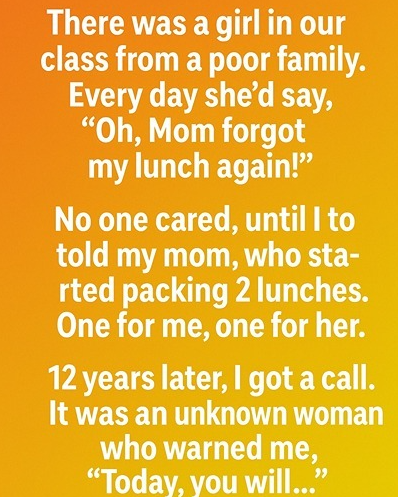I still remember her exactly as she was at eleven years old—the quiet girl with the soft smile, the kind of kid who faded into the background unless you made an effort to really notice her. She sat two rows over in our fifth-grade classroom, always polite, always prepared, always the one who stayed behind to help the teacher straighten up. But lunchtime told a completely different story.
Every day when the bell rang, the room exploded into the familiar chaos of torn wrappers, swapped snacks, and chatter. And every day, without fail, she would rummage through her backpack with the same practiced motion, pretending to search for something she already knew wasn’t there. After a minute or so, she’d give that tiny shrug and say lightly, “My mom forgot again,” as if it wasn’t the hundredth time.
Most kids didn’t notice. They were too busy living inside their own little bubbles. But I noticed. There was something in the way she said it—not embarrassed, not angry, just numb—that tugged at me even though I didn’t quite understand why.
That night, while drying dishes, I told my mom about her. It wasn’t some dramatic speech—just an offhand comment. Mom paused for a long second, thinking, and the next morning she packed two lunches: one for me and one “just in case.”
It started simply. I offered her the extra sandwich. She hesitated, then smiled. The next day, I did it again. And again. It wasn’t planned; it just became a routine only the two of us understood. She’d sit beside me, and we’d split whatever Mom had packed. At first she was shy, nibbling, insisting she’d “make up for it later.” But as the weeks passed, she opened up.
She told me about her cat, about the stories she wrote in a notebook she hid inside her desk, about how the smell of rain made her feel safe. She talked like she was revealing tiny secrets piece by piece—soft, careful, hopeful. I told her about my loud family, my cousins who drove me crazy, the video games I pretended to be good at. We laughed. We built inside jokes. We grew into the kind of friends who develop quietly and naturally, the way plants lean toward sunlight.
Then middle school arrived, and our paths split—new classes, new friends, new worlds. By high school, we were little more than familiar faces who waved in passing. Life moved the way life does: forward. College, jobs, early adulthood. But every so often I’d think of her, picture that shy smile over a shared lunch, and wonder what became of her. Whether she was okay. Whether she ever stopped pretending her mom “forgot.”
Twelve years slipped by.
Then one afternoon, my phone lit up with a number I didn’t recognize. I almost didn’t answer, but something nudged me to. A warm, slightly nervous voice said my name—and instantly I knew. It was her.
She told me she’d been trying to track me down for months—scrolling old yearbooks, messaging former classmates, following threads until they led to me. Not because she needed anything. Not for drama. Just to say thank you.
As she spoke, I went completely still. She said that back in fifth grade, her family had been in the middle of a harsh, private storm—money tight, food inconsistent, home life chaotic. Lunches were a luxury. She told me she’d felt invisible then, like she was slipping through the cracks.
“But you noticed,” she said quietly. “You didn’t make it a big deal. You didn’t pity me. You just shared. And that made me feel seen.”
Her voice wavered but didn’t break. She told me those shared lunches had become the one moment of her day she looked forward to, the one time she didn’t feel forgotten or like a burden.
“You didn’t just share food,” she said. “You shared hope. You made a sad part of my life feel less lonely.”
I gripped the phone, stunned. I’d only been a kid. I wasn’t trying to be a hero. I wasn’t thinking about her struggles or her future. It had just felt natural to help. But to her, it had been a lifeline.
Then she told me something that hit even harder.
Years later, when she finally found stability, she started a program at her local community center—an initiative for kids who come to school hungry but stay quiet about it. She said the whole thing was inspired by our childhood lunches.
“I wanted other kids to feel what I felt,” she said. “Safe. Seen. Cared for.”
After the call ended, I sat there silently, overwhelmed by how something so small, so easy, so forgettable to me had reached so far into her life. It felt like discovering a door you didn’t realize you’d opened—one someone else had been walking through for years.
It reminded me of a simple truth: compassion doesn’t have to be loud. It doesn’t have to be huge or life-changing in the moment. Sometimes it’s a sandwich wrapped in foil, a shared seat, the act of noticing someone who feels unnoticed.
The tiny gesture you barely think about might become someone else’s anchor.
I hung up with a warm, heavy feeling in my chest—the kind that tells you life sometimes stitches together moments you didn’t even know mattered. Kindness isn’t wasted. It travels. It lingers. It becomes part of someone else’s strength long after you forget it happened.
And sometimes, if you’re lucky, it finds its way back to you—not as repayment, but as a reminder of who you were, and who you still want to be.
